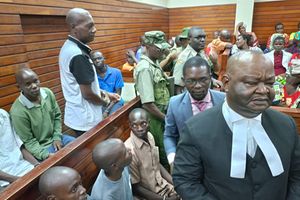Matiang'i declares Friday a public holiday to mark Idd-ul-Adha

The first group of female pilgrims praying in the Grand mosque in the holy city of Mecca at the start of the annual Muslim Hajj pilgrimage on July 29, 2020. PHOTO | AFP
What you need to know:
- Traditionally, during the festival, Muslims around the world gather to mark one of the holiest days in the religious calendar.
- But the Covid-19 pandemic has changed how many religious festivals are celebrated.
Interior Cabinet Secretary Fred Matiang'i has declared Friday a public holiday to mark Idd-ul-Adha.
According to Islamic teaching, Idd-ul-Adha (the feast of slaughtering) takes place on the 10th day of the third month after Ramadhan.
Idd-ul-Adha is an Islamic festival to commemorate the willingness of Abraham to follow Allah's command to sacrifice his son.
It also marks the end of Hajj, the annual Islamic pilgrimage to Mecca.
It is one of the two Idd celebrations, Idd-ul-Adha and Idd-ul-Fitr, and is often considered the holier of the two.
Traditionally, during the festival, Muslims around the world gather to mark one of the holiest days in the religious calendar.
But the Covid-19 pandemic has changed how many religious festivals are celebrated.
When he announced the holiday, the CS said, "In light of the ongoing Covid-19 situation and in fidelity with the Resolutions of the Fifth Session of the National and County Governments Coordinating Summit, all ceremonies in celebration of Idd-ul-Adha will be marked with minimal person-to-person contact, and in strict and full compliance with the guidelines issued by the Inter Faith Council with the approval of the Ministry of Health."
According to the Ministry of Health guidelines, congregational prayers have been discouraged despite places of worship being opened.
Social distance has also been encouraged in mosques where the prayers are expected to be conducted as opposed to the normal practice where Muslims gather in open air grounds.
The Idd prayers are usually marked in open air grounds as per the teachings, but this time, Mombasa county government, for instance has banned the same.
“The gathering of the faithful on open air grounds to celebrate the upcoming holiday will not be permitted so as to safeguard the health of the public,” reads a statement by the county health department.
The administration said the prayers are to be confined in mosques where appropriate guidelines have already been issued.
The guidelines in mosques include a maximum of 100 people who will be allowed at a congregational prayer which will not last more than 60 minutes.
Others include worshipers will have their temperatures taken before entering the mosques.
Toilets and ablution areas would remain close as the faithful will be required to take ablution from their homes.
After accessing the mosques, the worshipers will be required to have their masks on throughout a prayer session.




